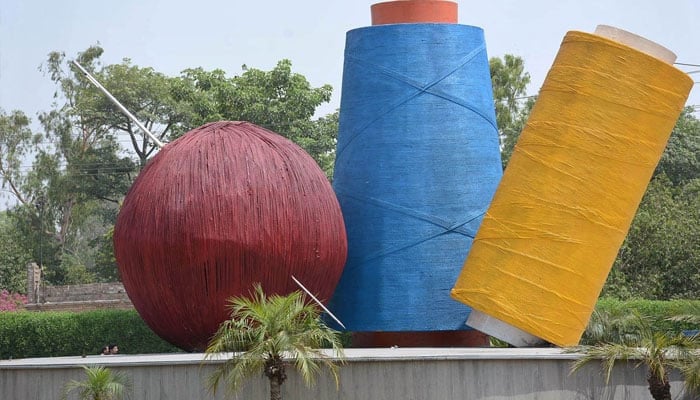Path to growth
LAHORE: Pakistan has never embarked on sustained growth which is not possible without an open economy that provides no special concessions, manages a meaningful flow of foreign direct investment, with robust capital market and political stability.
Pakistan technically operates on free market economic principles but the culture of SROs still distorts this principle and provides undue advantage to the beneficiaries of these SROs. The small businessmen are subjected to open market economy principles without providing them the regulatory cover to cope with foreign competition.
The big businesses particularly the foreign investors are provided undue concessions that create distortion in the economy. Political compulsions force even sincere opponents of SRO culture to move painfully slowly in this regard.
The benefits of even a highly improved macroeconomic indicators would remain below potential if we continued to compromise on principles of open market economy.
It is not necessary that Pakistan produce any raw material in the country if it costs higher than the rates prevailing in the global market. By providing duty protection on basic raw materials used by scores of industrial sectors we tend to make our end products more expensive.
The case of polyester fiber is one glaring example that booted Pakistan out of the global blended yarn and fabric market. Globally 80 percent of textile products are made from a blend of man made (polyester) fiber and cotton.
Pakistan has no share in blended textile market and is solely dependent on cotton based textiles that account for only 20 percent of the global textile market.
Bangladesh and Vietnam though both do not produce cotton or polyester. He said duty free imports of these basic raw materials have provided an advantage to these countries over Pakistani exporters. Bangladesh entered the global textile market in 1990’s and Vietnam at the start of this century. He said their textiles exports are now two to three times higher than total exports of Pakistan.
Pakistan spoiled foreign investors in late 90’s when it granted duty protection to various investors that established small raw material units in Pakistan, though the capacities were not enough to fulfill the needs of domestic industries but the duty protection ensured that the investors kept their rates nominally lower than the landed cost of duty paid imports. After this no investment was made by foreign investors without assured high protection. Independent power Producers were given a guaranteed rate of return on their investment. The rate of return was much higher than similar incentives given to some of the same foreign investors in Bangladesh.
Moreover our investment policy does not bind the investor to venture some of its production in exports.
This policy encouraged foreign investors to dump their low capacity plants in Pakistan that were closed elsewhere. All car manufacturing plants in Pakistan have low capacities which make it impossible for them to change the models according to the latest global trends.
The tooling cost of new models cannot be recovered with annual production of 10000-50000 units per year. Pakistani consumers rightly complain of being served with obsolete technology.
The investment in fast food chains is a regular drain on the foreign reserves. These chains import a large quantities of their inputs. Then their franchises pay royalty to them. The investment made in food chains 27 years back is much less than what we lose in foreign exchange every year. In fact a leading business tycoon Tariq Saigol warned the government on this type of investment.
Moreover real investment will come with the political stability which is still not on the horizon. It was the political stability and political consensus that encouraged China to start the multibillion dollar China Pakistan Economic Corridor 12 years back. But it stopped investment midway as political stability evaporated and policies were changed overnight.
-
 Cuba-Canada Travel Advisory Raises Concerns As Visitor Numbers Decline
Cuba-Canada Travel Advisory Raises Concerns As Visitor Numbers Decline -
 Anthropic Buys 'Super Bowl' Ads To Slam OpenAI’s ChatGPT Ad Strategy
Anthropic Buys 'Super Bowl' Ads To Slam OpenAI’s ChatGPT Ad Strategy -
 Prevent Cancer With These Simple Lifestyle Changes
Prevent Cancer With These Simple Lifestyle Changes -
 Air Canada Flight Diverted St John's With 368 Passengers After Onboard Incident
Air Canada Flight Diverted St John's With 368 Passengers After Onboard Incident -
 Experts Reveal Keto Diet As Key To Treating Depression
Experts Reveal Keto Diet As Key To Treating Depression -
 Inter Miami Vs Barcelona SC Recap As Messi Shines With Goal And Assist
Inter Miami Vs Barcelona SC Recap As Messi Shines With Goal And Assist -
 David Beckham Pays Tribute To Estranged Son Brooklyn Amid Ongoing Family Rift
David Beckham Pays Tribute To Estranged Son Brooklyn Amid Ongoing Family Rift -
 Jailton Almeida Speaks Out After UFC Controversy And Short Notice Fight Booking
Jailton Almeida Speaks Out After UFC Controversy And Short Notice Fight Booking -
 Extreme Cold Warning Issued As Blizzard Hits Southern Ontario Including Toronto
Extreme Cold Warning Issued As Blizzard Hits Southern Ontario Including Toronto -
 Lana Del Rey Announces New Single Co-written With Husband Jeremy Dufrene
Lana Del Rey Announces New Single Co-written With Husband Jeremy Dufrene -
 Ukraine-Russia Talks Heat Up As Zelenskyy Warns Of US Pressure Before Elections
Ukraine-Russia Talks Heat Up As Zelenskyy Warns Of US Pressure Before Elections -
 Lil Nas X Spotted Buying Used Refrigerator After Backlash Over Nude Public Meltdown
Lil Nas X Spotted Buying Used Refrigerator After Backlash Over Nude Public Meltdown -
 Caleb McLaughlin Shares His Resume For This Major Role
Caleb McLaughlin Shares His Resume For This Major Role -
 King Charles Carries With ‘dignity’ As Andrew Lets Down
King Charles Carries With ‘dignity’ As Andrew Lets Down -
 Brooklyn Beckham Covers Up More Tattoos Linked To His Family Amid Rift
Brooklyn Beckham Covers Up More Tattoos Linked To His Family Amid Rift -
 Shamed Andrew Agreed To ‘go Quietly’ If King Protects Daughters
Shamed Andrew Agreed To ‘go Quietly’ If King Protects Daughters




